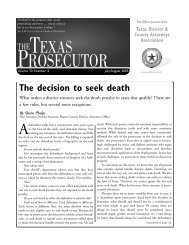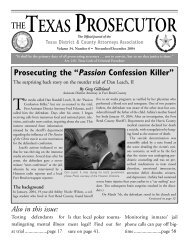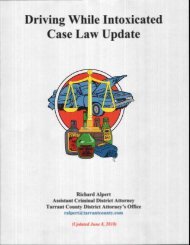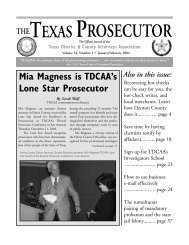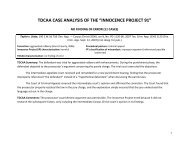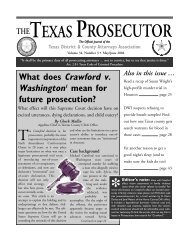Driving While Intoxicated Case Law Update - Texas District ...
Driving While Intoxicated Case Law Update - Texas District ...
Driving While Intoxicated Case Law Update - Texas District ...
Create successful ePaper yourself
Turn your PDF publications into a flip-book with our unique Google optimized e-Paper software.
5. SEARCH WARRANT AFFIDAVIT FAILED TO SET OUT THE BASIS FOR<br />
THE TRAFFIC STOP NOT FATAL<br />
Huqhes v. State, 334 S.W.3d 379 (Tex.App.-Amarillo 2011, reh. overruled).<br />
Defendant attacks the affidavit for failing fo sfafe the specific articulable facts to authorize the stop<br />
of the defendant. lt also failed fo sfafe how the blood draw would constitute evidence of DWl, and<br />
complained about slash marks that are not explained in the part describing FSf's. Language<br />
asserfs that officer swore to affidavit before the magistrate when in fact it was sworn to in front of<br />
an officer at station who was notary so the affidavit constitutes perjury. No exigent circumstances<br />
warranted the intrusion of blood draw. ln rejecting that argument, the Court explainsthatthe failure<br />
to detailfacts regarding fhe basrs for the sfop ts not fatal to magistrate's overall PC determination<br />
because fhe issue is not reasonable suspicion to detain but rather PC to authorize a search. ln<br />
rejecting the blood use argument, the Court finds that the magistrate is allowed to make a<br />
reasonable inference that blood would be analyzed for presence of alcoholfor use in prosecution<br />
of DWI. S/ash marksaremerely"l"sthatindicateofficerobserued fhose matters.Astofher.ssue<br />
of who it was sworn to, this is judged to be extra wording that does not impact the legality of the<br />
warrant. The Court further finds that no exigent circumstances are required to authorize a warrant<br />
based on PC for a blood draw.<br />
6. SEARCH WARRANT AFFIDAVIT WAS NOT SIGNED BY AFFIANT = NOT<br />
FATAL<br />
Smith v. State, 207 S.W.3d787 (Tex.Crim.App. 2006).<br />
Affiant swore before magistrate and then failed to sign the affidavit. The magistrate did not notice<br />
the omission and signed the SW. Court of Appeals held failure to sign affidavit does not invalidate<br />
warrant. Court of Criminal Appeals agreed holding that the "purpose of the affiant's<br />
signature...memorializes the fact that the affiant took the oath; itis nof an oath itself." Dicta in the<br />
opinion references that some federal an sfafe courts now permit telephonic warrants "and one can<br />
foresee the day in which search warrants might be obtained via email or a recorded video<br />
conference with a magistrate located many miles away. ln state as large as lexas, such<br />
innovations should not be foreclosed by the requirement of a signed affidavit in officer's oath which<br />
can be memorialized by other equally satisfying means. We leave fhose potentialfuture changes<br />
to the legislature." The Court further nofes that forgetfulness or carelessness in formalities of<br />
affidavit may affect credibility of the officer.<br />
7. SIGNATURE ON WARRANT NOT LEGIBLE IS NOT FATAL<br />
Nquven v. State , 2010 WL 2518250 (Tex.App.-Houston [14 Dist.] 2010, no pet.).<br />
ln attacking the blood search warrant, the defendant argued that because fhe signature on the<br />
warrant affidavitwas illegible, the warrantwas defective. The Court rejected this argument pointing<br />
out it is the act of swearing and not the signature that is essenfial Additionally, another officer<br />
testified that he and the magistrate did recognize the signature.<br />
]-02



